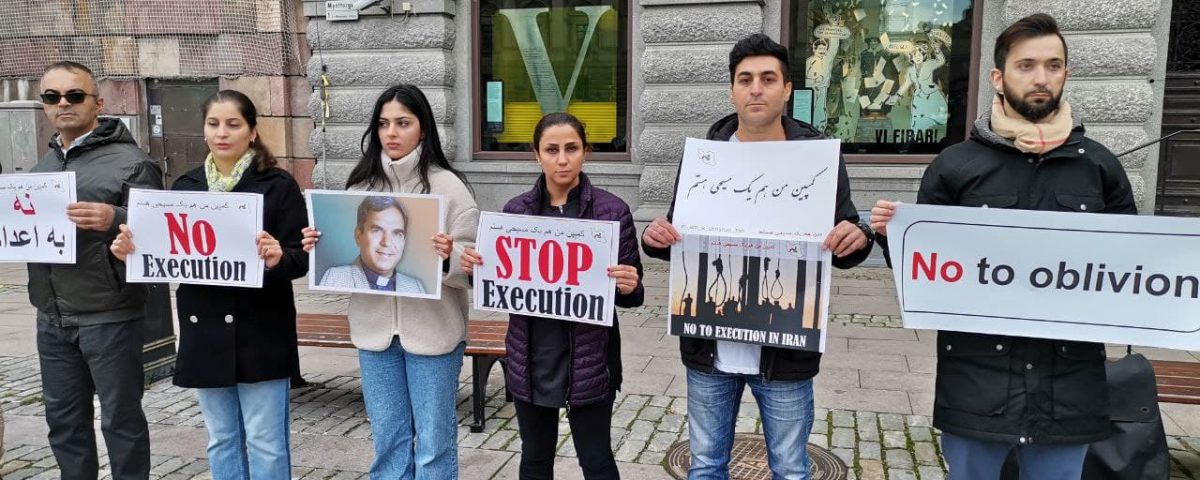Campaigners: Christian Persecution is Real in Iran—Accept Their Asylum Requests

Many Christian converts seeking asylum, even after leaving Iran, have been painfully dealing with the denial of protection by their countries of destination for years now. About a year ago, a group of Christian converts living in Stockholm launched the campaign “I am a Christian too” to raise awareness of the systematic violation of rights of Christian converts in Iran and to change the approaches used to examine Christians’ asylum applications. These Christian converts have been staging regular protest rallies outside parliament in the Swedish capital of Stockholm for about 70 days. The campaign also protests the ongoing human rights abuses in Iran and the repression of civil society activists and prisoners of conscience.
Amir Hossein Jaafari, a Christian convert and one of the organizers of the rallies, said that “only 20–30 percent of the Iranian refugees [Christian asylum seekers in Sweden] receive a positive decision from the Swedish Migration Agency. This figure is much lower in Migration Courts of Appeal, where most appeals are refused. Ultimately, except in very rare cases, the majority of appeals will not be accepted by the Supreme Court of Sweden, and, consequently, the Christian asylum seekers will quickly find themselves a member of the so-called parallel societies. At this stage, the asylum seeker goes through tough times, especially financially, in a life that has been affected by emotional and psychological trauma. Our friends have been left in limbo in Sweden for 3 to 16 years. It looks as if no one is doing anything. Their lives are of no value. We see all these things happening, not realizing the fact that no asylum seeker—if not forced to do so—wants to leave his/her family, loved ones, and homeland and come to struggle with numerous difficulties in exile.”
This Christian activist added that “the Swedish Migration Agency—for reasons such as a lack of faith in the heart, absence of sufficient evidence to prove that your life would be in danger if you return to the country, the church’s or priest’s letters that cannot prove that you are a true Christian and it is not clear who is threatening you in cyberspace—reject asylum applications based on what is virtually unprovable and fundamentally at odds with the gospel and the words of Jesus Christ. In other words, you have not been able to show us emotionally that you are a true Christian. They also reason that you are not a key figure whose life will be in danger upon return to Iran, although most of the persecuted Christian converts in Iran who are in prison for their faith on national security charges have been ordinary citizens whose names were spread on social media only after their arrest and imprisonment. We are one of those who have decided to believe in Christ and “this is our only crime.”
The campaign activities have been covered several times by foreign media in recent months. Activists attending campaign rallies and gatherings attract the public’s attention with posters and banners of the Iranian Christians being persecuted, with slogans in Persian, Swedish, and even English and including symbols such as the cross. The campaign has also raised public awareness by citing the reports by Christian organizations such as Open Doors and Article 18.
According to Jaafari, the campaign held a large rally on June 20, World Refugee Day, attracting more than 60 people and calling for a change in the processing of the asylum cases of Christian converts in Sweden. Since July 15, 2021, the campaign has staged daily protest rallies in front of parliament to give people the opportunity to learn more about the situation of Christian converts in Iran. The campaign used more than 12 banners reading “Annual Report 2020 by Article 18” and “Open Doors’ annual report on the persecution of Christians in Iran.”
“The campaign has always been willing to consider the issues regarding human rights and the rights of Christian converts and other religious minorities in particular. In the meantime, it has worked closely with other political and human rights organizations, including the International Committee against Execution in Stockholm. For instance, we collaborated on several projects, such as gathering outside Hamid Nouri’s court, pleading for the release of the Afkari brothers from solitary confinement, expressing support for the people of Khuzestan, and defending Iranian women’s rights (especially Christian women who are facing stronger discrimination)—most of which have been covered by the media and well-publicized. Finally, I would like to say that we will try to the best of our ability to be the voice of the Iranian persecuted Christian converts in the international community, institutions, and governments,” Jaafari added.
Over the past four decades, the Iranian regime has shut down Persian-language churches and harassed Christians by attacking their homes and churches. At least seven church leaders have been killed in Iran since the 1979 revolution. Open Doors, a Christian organization, recently ranked Iran as 8th in its annual “World Watch List” report, which lists the top 50 countries where Christians are the most persecuted for their faith. In addition, a group of UN Special Rapporteurs issued a letter to the Iranian regime and expressed serious concerns about the systematic persecution of Christians, especially Christian converts in Iran.
